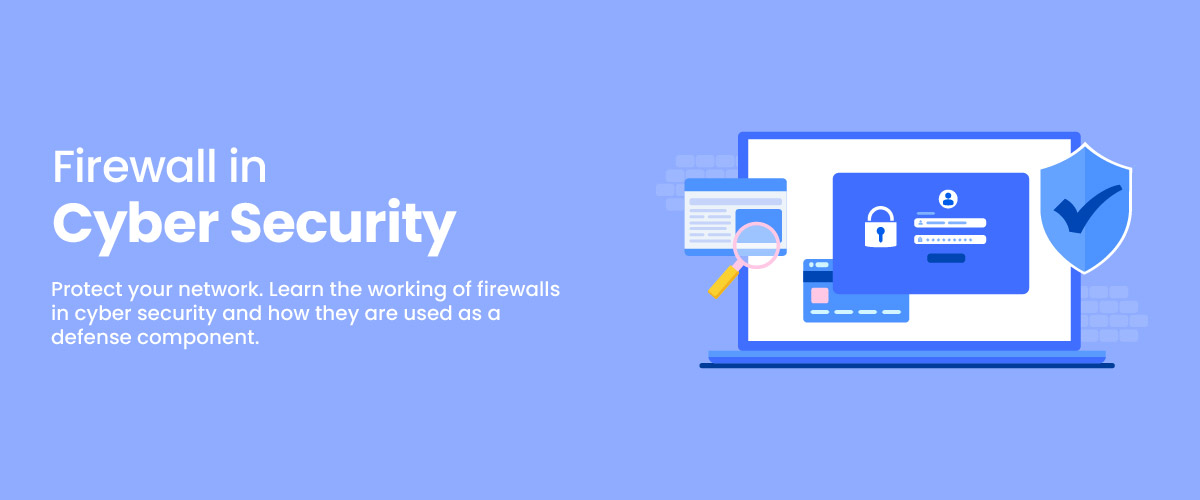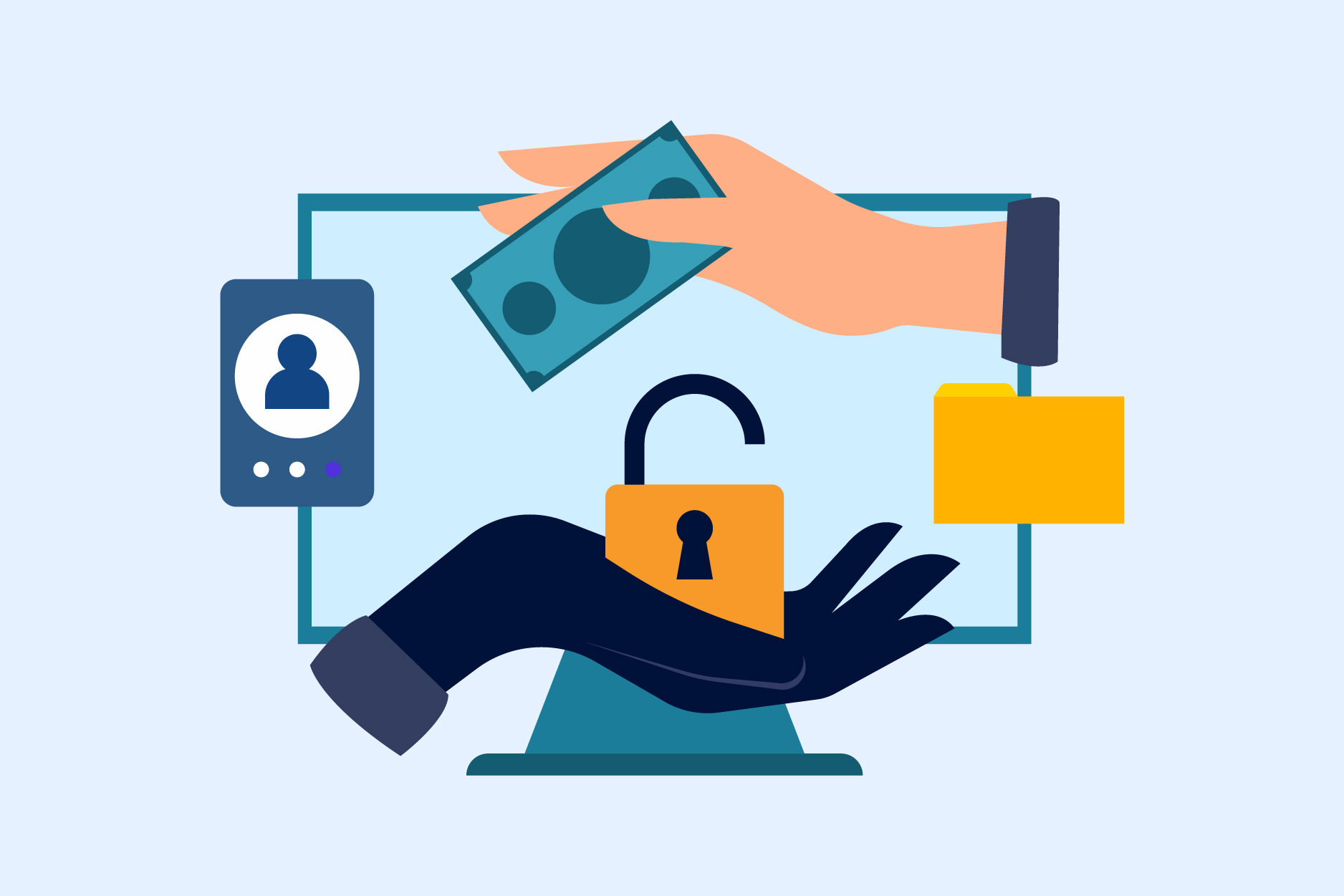What is a Firewall in Cyber Security?
A firewall is a security system that oversees and manages the flow of data entering and exiting a network according to established security guidelines. It functions as a shield between a dependable network, like one’s home or workplace, and an insecure network, such as the internet, in order to defend and protect confidential information and devices from unauthorized entry, cyberattacks, and harmful software.
Firewall in Cyber Security
A network firewall security is a system that oversees and manages the flow of data entering and exiting a network according to established security guidelines. This firewall work as a shield between a dependable network, like one’s home or workplace, and an insecure network, such as the internet, in order to defend and protect confidential information and devices from unauthorized entry, different types of cyber attacks, and harmful software.
So that we know what is firewall in computers, let’s discuss more about its types in detail.
History of Firewalls
Firewalls are an important part of computer security, developed to control and protect access to internal resources. They have advanced from basic packet filtering to more sophisticated forms throughout the growth of the Internet.
- 1988: First Generation – Packet-Filter Firewall was introduced by Digital Equipment Corporation (DEC). This type of firewall operated statelessly at the Network layer, inspecting packets based on filtering rules.
- 1989: Second Generation – Stateful Firewall developed by AT&T Bell Labs was created. It maintained active sessions while managing packet filtering at both the Network and Transport layers simultaneously.
- 1991: Third Generation – Application Layer Firewall launched by DEC with its ‘DEC SEAL’ product line that inspected data traveling to/from running software for malware protection operating within the OSI model’s Application layer. Other prominent releases in this space were the FWK, Gauntlet from Trusted Information Systems, as well as Check Point’s ‘FireWall-1’ solution hitting markets everywhere.
- 2004: UTM – 2004 saw IDC dubbing a new term into existence; Unified Threat Management or UTM which bundled network security technologies such as VPN chaining along with traditional ones.
- 2009: NGFW – Lastly, in 2009 Gartner gave us a next-level NGFW combining legacy functions alongside newer features including DPI, Sandboxing, etc.
Types of Firewalls in Cyber Security
There are several types of firewalls in cyber security designed to address specific needs. These include the following.
1. Packet-Filtering Firewalls
These firewalls inspect data packets and determine whether to allow or block them based on rules set by the network administrator.
2. Circuit-Level Gateways
These firewalls monitor the connection setup process, ensuring that only authorized connections are allowed.
3. Stateful Inspection Firewalls
These firewalls combine the features of both packet-filtering and circuit-level gateways, maintaining information about each connection to make more informed decisions about allowing or blocking traffic.
4. Application-Level Gateways (Proxy Firewalls)
These firewalls work at the application layer, inspecting the contents of data packets for specific protocols and blocking or allowing traffic based on the network administrator’s rules.
5. Next-Generation Firewalls (NGFWs)
These advanced firewalls include additional features such as intrusion prevention systems, application control, and threat intelligence feeds, providing even more comprehensive protection.
How do Firewalls Work?
Firewalls work by monitoring network traffic, analyzing data packets, and either allowing or blocking them, based on predefined rules set by the network administrator. These rules can be customized to suit the needs of the organization, allowing certain types of traffic while blocking others that may pose a security risk.
- Firewalls act as a wall of protection around your network to keep out attackers, continuously filtering and examining incoming and outgoing data 24/7.
- It is like having an advanced security guard who knows the identities of millions of potential criminals; if one attempts to access them, they will be stopped from entering or leaving the premises.
- The firewall’s methods may include packet filtering, proxy services, and stateful inspection in order to block potentially damaging code while stopping intruders from exploiting vulnerabilities within your system for their malicious purposes.
- A firewall can either operate inside a hardware device or through software running on computers connected to the same local area network (LAN).
How to Use a Firewall for Protection?
To use a firewall for protection, it must be installed and configured properly. This means you need to have the relevant cyber security skills like setting up rules to allow legitimate traffic and block potentially harmful traffic. Additionally, firewalls should be kept up-to-date with the latest security patches and updates to ensure they are capable of handling emerging threats.
Here are the steps to configure your firewall for protection:
- Establish firewall protection.
- Design the zones and IP addresses for your firewall.
- Set up Access Control Lists (ACLs).
- Configure other services and logging within the firewall.
- Perform testing of your configured Firewall settings.
For a better understanding of how firewalls work, an ethical hacking course might be of great help.
Why Do We Need Firewalls?
In today’s increasingly connected digital world, ensuring the security of networks and devices is of paramount importance. Firewalls are a critical component of any cyber security strategy because they provide a line of defense against unauthorized access, hackers, and malware.
As we dive into the advantages and disadvantages of firewalls in cyber security, it is essential to understand the role they play in protecting organizations from cyber threats. Here are various advantages of firewalls.
- Enhanced Security- Firewalls provide a barrier between trusted and untrusted networks, helping protect sensitive data and devices.
- Customizable Protection- Firewalls can be configured to allow or block specific types of traffic based on organizational requirements.
- Reduced Risk of Attack- Firewalls help prevent unauthorized access, SQL injections, phishing attacks, and malware infections, reducing the likelihood of a successful cyber attack.
- Improved Network Management- Firewalls enable organizations to monitor and control network traffic, allowing for more efficient resource allocation and better performance.


How Can I Choose the Right Firewall?
Selecting the right firewall for your organization involves considering several factors, including your network size, the type of traffic you want to control, and your specific security requirements. Here are some tips for choosing the right firewall:
- Assess Your Organization’s Needs– Determine the level of security required and the types of threats you need to protect against.
- Choose the Appropriate Type of Firewall- Consider the various types of firewalls and select one that best meets your organization’s requirements.
- Scalability- Ensure that the firewall you choose can grow with your organization and handle increased traffic as needed.
- Ease of Use- Select a firewall with a user-friendly interface and simple configuration options.
- Compatibility- Make sure the firewall is compatible with your existing network infrastructure and devices.
- Support and Updates- Choose a firewall from a reputable vendor that provides ongoing support and regular updates to ensure maximum protection against emerging threats.
Importance of NAT and VPN
To understand the importance of these 2 different factors, let’s take a look at them individually.
Importance of NAT
NAT is a technology used in computer networking that allows multiple devices within the same network to share one limited format IP address when they connect with the internet. NAT is very useful in computer networking. Here are some of the reasons why it’s widely accepted:
Conserves Formatted IP Addresses: NAT provides a method for preserving the limited supply of IPv4 addresses by allowing multiple devices inside a local network to share one public address. Not only does this allow ISPs (Internet Service Providers) and end-users to keep costs down, but it also keeps from exhausting all available 4.3 billion+ IPv4 addresses as more Internet-connected gadgets become commonplace.
Security and Privacy: NAT (Network Address Translation) provides an extra layer of privacy and security by concealing private IP addresses from external websites. This prevents webmasters, advertisers, and other third parties from tracking individual device/user online activities within the network as they can only see the public IP address assigned to it. As a result, users’ browsing habits remain anonymous unless voluntary information is given or cookies are enabled which allows for personalized advertising targeting certain individuals.
Importance of VPN
VPN is a technology that provides secure and encrypted connections between your device and a remote server in another location. It masks your IP address, encrypts internet traffic, and keeps it more private for increased security. Here are some of the reasons why VPN is important.
Data Encryption: The significance of VPNs lies in their ability to encrypt data and protect it from prying eyes. By creating a secure tunnel between your device and a remote server, any information transmitted is safeguarded against interception or monitoring by an internet service provider (ISP) or other third parties.
Hide Your Location From Webmasters: VPNs provide a way for users to mask their real location and appear as if they are in another country or region. This can be used to access certain content, circumvent censorship or surveillance efforts, and potentially get lower prices based on regional pricing differences.
Bypass Restrictions: VPNs provide a way for users to get around restrictions put in place by webmasters and network administrators. By connecting to an external server, people can access websites that might have blocked their original IP address, allowing them the freedom to browse the internet even when certain ports or sites are restricted. Moreover, encryption technology allows for secure online activities while preserving privacy.
What Are Next Generation Firewalls (NGFW)?
An NGFW is an advanced network security device that offers a more comprehensive form of protection than traditional firewalls. In addition to stateful examination of inbound and outbound internet traffic, these systems provide extra features, such as application-specific control, integrated intrusion prevention technology, and cloud-based threat intelligence data.
Gartner states that for a firewall to be categorized as “next-generation”, it must possess certain elements, such as:
- Standard stateful inspection capabilities
- An integrated intrusion prevention system
- The capability of recognizing and blocking potentially dangerous applications
- Access to threat intelligence resources and information feeds from the future in order to keep up with any architectural modifications
- Strategies tailored toward handling new security risks which evolve over time
Common Firewall Vulnerabilities and Solutions
Even with a firewall in place, vulnerabilities may still exist that can be exploited by attackers. Some common firewall vulnerabilities and how to address them include:
- Misconfiguration- Ensure that your firewall is configured correctly and follows best practices to minimize the risk of unauthorized access.
- Outdated Software- Regularly update your firewall with the latest security patches and updates to protect against new threats.
- Insufficient Logging and Monitoring- Implement robust logging and monitoring systems to detect and respond to suspicious activity promptly.
- Rule Complexity- Keep firewall rules as simple as possible, and avoid overly complex rule sets that can be difficult to maintain and troubleshoot.
Real-Time Applications of Firewall
Firewalls play a crucial role in various real-time applications to protect networks and ensure smooth functioning:
- Corporate Networks- Firewalls protect sensitive corporate data and resources from unauthorized access, ensuring that only authorized employees can access the network.
- E-Commerce Platforms- Firewalls safeguard customer information and payment details by blocking malicious traffic and preventing unauthorized access to servers.
- Banking and Financial Institutions- Firewalls secure financial transactions and customer data, preventing fraud and unauthorized access to sensitive information.
- Government Organizations- Firewalls protect critical government systems and data from cyberattacks and unauthorized access.
- Healthcare Industry- Firewalls secure patient data and ensure the confidentiality and integrity of electronic health records.
Difference between a Firewall and Anti-virus
Discover the key differences between firewalls and anti-virus software, and learn how they work together to keep your computer safe and secure.
| Attributes | Firewall | Anti-virus |
| Purpose | Protects networks by monitoring and controlling incoming and outgoing traffic based on predetermined rules. | Detects, prevents, and removes malicious software (malware) from devices. |
| Functionality | Acts as a barrier between trusted and untrusted networks, preventing unauthorized access and malicious traffic. | Scans files and applications on devices for known malware signatures and suspicious behavior. |
| Layer of Protection | It has a ‘Network layer’ that focuses on protecting the entire network from external threats. | It has a ‘Device layer’ that focuses on protecting individual devices from malware infections. |
| Effectiveness | Effective in preventing unauthorized access and blocking malicious traffic, but cannot protect against all threats. | Effective in detecting and removing malware from devices, but cannot prevent unauthorized network access. |
| Updates | Firewall rules and signatures are updated to respond to evolving threats. | Regular updates to malware signatures and detection algorithms to identify new threats. |
| Cost | Can be expensive to implement and maintain, especially for smaller organizations. | Generally less expensive than firewalls, with various pricing options available for businesses and individuals. |
Conclusion
A discussion about online safety is incomplete without firewalls in cyber security. They are vital at offering a crucial barrier to defend against unwanted intrusions and harmful activity. By grasping the various firewall categories, and how firewalls operate in practice, organizations can make well-informed choices about selecting and managing the most suitable firewall for their requirements. This will contribute to a safer and more resilient network landscape, shielding important resources and information from potential online risks.







